Clergy Epistle
Beloved in Christ,
Many of you have asked, “Where does the Church stand on the situation in Gaza?” As a parish of the Diocese of Maryland, within The Episcopal Church, and as part of the worldwide Anglican Communion of more than 85 million members, St. Anne’s does not issue independent statements apart from these ecclesial bodies. Instead, our task is to listen, learn, and live into what our Church has prayerfully discerned.
Therefore, I write to highlight the consistent witness of our wider Church, even as the United Nations General Assembly deliberates and as a number of U.S. allies have recognized Palestine as a distinct nation-state. We live in a season of grief, fear, and anguished headlines from the Holy Land. As your rector and fellow disciple, I write to name our sorrow, to remind us of our Christian duty to condemn violence against civilians wherever it occurs, and to point us again to the Church’s consistent moral horizon: the dignity of every human being and a just peace in which all people may flourish in security and freedom.
We grieve the horror of the October 7, 2023 attacks, which The Episcopal Church has named as indefensible terrorism. We grieve also the vast suffering of civilians in Gaza and the West Bank amid ongoing military operations and displacement. In this grief, we must remain sensitive to all people—Jewish, Muslim, and Christian alike—who carry both historical trauma and present fear. As Christians, we categorically reject antisemitism, Islamophobia, and every form of prejudice. To stand against anything that denigrates the humanity of others is not optional; it is at the very heart of our baptismal covenant. Standing against antisemitism is a mark of our values. Advocating for human rights and self-determination for all peoples is likewise a mark of our values as Christians.
The Episcopal Church has long affirmed the self-determination of two secure states and has rejected any solution imposed by force or unilateral action. The 81st General Convention (2024) adopted Resolution D013, “Affirm the Imperative of a Palestinian State,” which expresses “our hope for all the people of Israel and Palestine to enjoy freedom, peace, justice, and national self-determination,” including “the creation of a Palestinian State, coexisting with the Jewish State of Israel.” This resolution stands in continuity with decades of Episcopal teaching: that a two-state solution must be achieved through peaceful, bilateral negotiations, with Jerusalem as a shared capital. This is not a new idea. The Anglican Communion, at the 1988 Lambeth Conference, affirmed both Israel’s right to recognized, secure borders and the Palestinian people’s right to self-determination, explicitly including “the establishment of their own state” (Resolution 24, “Palestine/Israel”).
The two-state horizon is not merely political language; it is a moral grammar grounded in the recognition of the image of God in every human being, our acknowledgment of human fallenness, and the command of Christ to love our neighbor as ourselves. It insists that Jewish and Palestinian futures are not zero-sum, and that real security is inseparable from real justice. The Church’s teaching calls us to resist despair and polarization by seeking concrete arrangements that secure equal dignity, freedom of movement, economic viability, the safeguarding of holy places, and political self-determination for both peoples.
In that spirit, I commend the following as practical, faithful steps for our community:
Prayer and Lament – Regular intercessions for hostages and prisoners, for the bereaved, for the injured and displaced, for the starving, and for leaders with the courage to choose de-escalation, humanitarian access, and durable ceasefire. We will include this in our worship and prayer services.
Tangible Mercy – Support for Anglican/Episcopal partners engaged in medical, pastoral, and humanitarian ministries across the region. Consider donating to Episcopal Relief & Development’ Middle East Fund or the American Friends of the Episcopal Diocese of Jerusalem.
Whatever one’s personal analysis of unfolding events, our imperative as Christians remains the same: to seek and support nonviolent, negotiated arrangements that secure safety and self-determination for all peoples. Amid shifting headlines, we are called to condemn terror, protect civilians, reject antisemitism and Islamophobia, remember the ancient Christian community of the Holy Land, and maintain a sustained commitment to peace.
This is slow, hard, and patient work. It requires us to hold grief and hope together, to resist easy narratives, and to keep faith with the God who in Christ has “broken down the dividing wall.” May our words be gentle, our consciences courageous, and our prayers unceasing—until justice and peace embrace in the land we call holy. May we look always to our Lord Jesus Christ, who ushers in the promise of a new heaven and a new earth.
In the peace of Christ,
The Rev. Manoj M. Zacharia PhD., Rector
References
The Episcopal Church. General Convention, 81st (2024), D013 “Affirm the Imperative of a Palestinian State.” Final text and status (concurred as substituted). VBinder.
Episcopal News Service. “GC81 Bishops Condemn Hamas’ Oct. 7 Attack, Urge Protection of Civilians in Gaza, and Track Related Middle East Resolutions.” June 23, 2024.
Episcopal Church Archives. Policies and Statements on Israel and Palestine (1961–2015). Summarizes TEC’s consistent two-state stance, negotiated settlement, and shared Jerusalem. extranet.generalconvention.org.
The Lambeth Conference. Resolution 24: Palestine/Israel. Lambeth Conference, 1988. anglicancommunion.org.
Episcopal News Service. “Overview of GC81 Israel–Palestine Docket.” April 17, 2024.
Episcopal News Service. “Rebuilding Gaza and the Imperative of Palestinian Self-Determination.” February 6, 2025.
